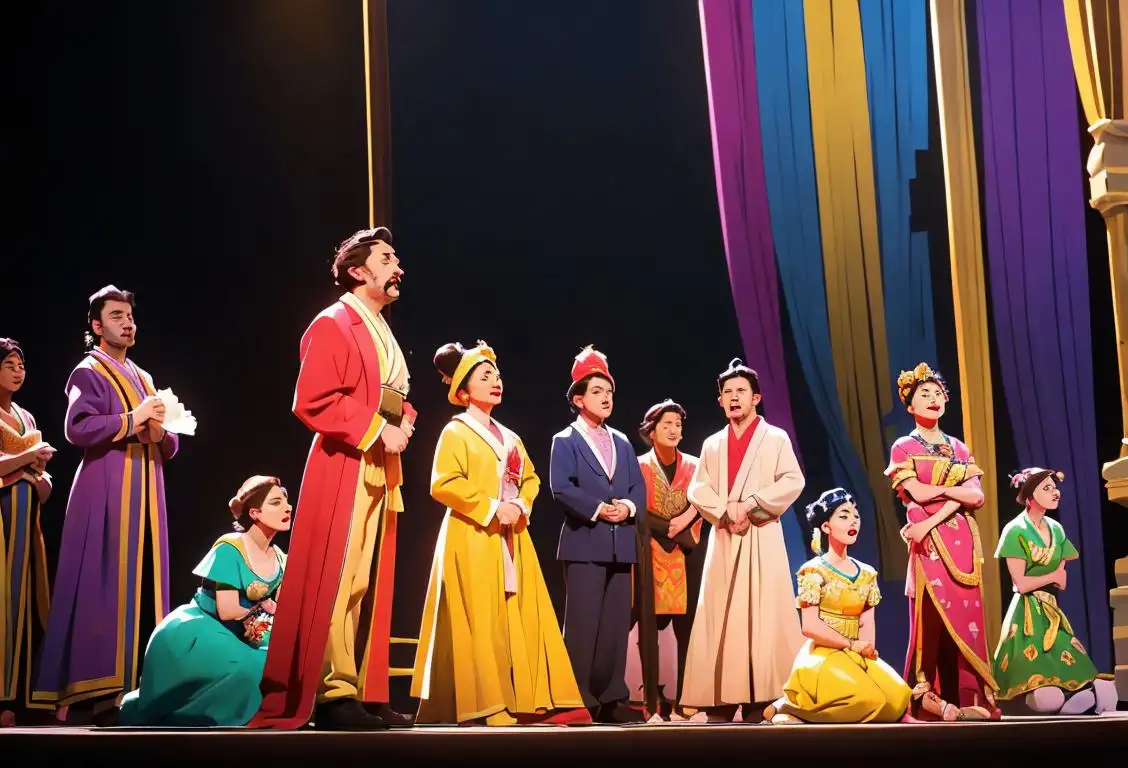National World Theatre Day

Welcome, theater enthusiasts, to the enchanting realm of National World Theatre Day! This extraordinary day celebrates the magic of theater and all those talented individuals who transport us to different worlds and evoke a myriad of emotions. So, grab your popcorn, sit back, and let's dive into the fascinating history and significance of World Theatre Day!
When is World Theatre Day?
It's national world theatre day on the 27th March.
From Ancient Origins to Modern Stages
The origins of theater can be traced back to the ancient civilizations of Greece and Rome, where performances were an integral part of religious festivals. In fact, the word 'theater' itself comes from the ancient Greek word 'theatron,' meaning 'a place for viewing.' Since then, theater has evolved and flourished across different cultures, captivating audiences with its power to tell stories.
Today, theater encompasses a wide range of genres, from captivating dramas to side-splitting comedies, thought-provoking musicals to avant-garde experimental productions. Theatrical performances are staged in grand theaters, intimate black boxes, open-air amphitheaters, and even makeshift spaces, proving that a little creativity can transform any location into a stage.
A Platform for Creativity and Expression
Theater provides a platform for artists to unleash their creativity and explore the depths of human emotion. Actors, playwrights, directors, set designers, and countless others come together to breathe life into stories, allowing us to witness the extraordinary within the ordinary. The collaborative nature of theater fosters teamwork and encourages the exchange of ideas, resulting in mesmerizing productions that leave a lasting impact on audiences.
World Theatre Day: Celebrating the Magic
World Theatre Day, celebrated annually on March 27th, was first initiated by the International Theatre Institute (ITI) in 1961. Led by the legendary French playwright and actor, Jean Cocteau, the aim was to raise awareness about the value and importance of theater across the globe.
Each year, World Theatre Day is marked by a selected theater professional who shares their thoughts on theater and its impact. These messages are translated into multiple languages and distributed worldwide, uniting theater lovers from different cultures in a celebration of the performing arts.
Audiences: The Heart and Soul of Theater
Theatrical performances are incomplete without an enthusiastic audience. Whether it's the roars of laughter during a comedic masterpiece or the collective hush of anticipation before a climactic scene, the energy shared between actors and spectators is indescribable. World Theatre Day reminds us of the immense joy and power that theater brings to our lives and the importance of supporting the arts.
History behind the term 'World Theatre'
5th century BCE
Origins of theatre
The term 'world theatre' has its roots in ancient Greek and Roman civilizations. Theatre as an art form began in the 5th century BCE, with plays and performances happening regularly in amphitheaters and open-air theatres. These early performances were an integral part of religious festivals and often depicted mythological tales.
16th century
Emergence of Renaissance Theatre
During the Renaissance period, theatre underwent a significant transformation, and the term 'world theatre' started to gain prominence. The Italian Renaissance brought forth a renewed interest in ancient Greek and Roman culture, leading to the revival of classical theatre traditions. Playwrights like William Shakespeare in England and Molière in France became influential figures, creating timeless works that shaped the world theatre scene.
19th century
Development of Modern Theatre
By the 19th century, theatre had evolved into a global phenomenon, giving rise to the concept of 'world theatre.' This period saw the birth of realism in drama, with playwrights like Henrik Ibsen and Anton Chekhov challenging traditional theatrical conventions. The industrial revolution brought technological advancements that improved stagecraft and allowed for more elaborate productions.
20th century
Experimentation and Contemporary Theatre
In the 20th century, theatre became a platform for experimentation and innovation. The term 'world theatre' expanded to include diverse theatrical practices from different cultures, breaking boundaries and pushing the limits of the art form. From the avant-garde performances of the Dadaists and Surrealists to the groundbreaking techniques of practitioners like Bertolt Brecht and Jerzy Grotowski, the theatre landscape became more inclusive and dynamic.
21st century
Globalization and Technology
The advent of the 21st century brought further globalization of theatre. Cultural exchange and collaboration between theatremakers from around the world became more accessible, leading to the term 'world theatre' encompassing an even wider range of practices, styles, and themes. Technological advancements, such as live streaming and virtual reality, have also transformed the way audiences experience theatre, allowing for new possibilities and expanding its reach.
Did you know?
Did you know? The longest-running play in history is 'The Mousetrap' by Agatha Christie, which has been continuously running in London's West End since 1952. Talk about standing the test of time!Tagged
awareness funFirst identified
27th March 2020Most mentioned on
27th March 2020Total mentions
11Other days
Nurses Day
Former Prisoner Of War Recognition Day
Press Day
Handloom Day
Heroes Day
Memorial Day
Dance Day
Bestfriends Day
Liberation Day
Love Your Pet Day









